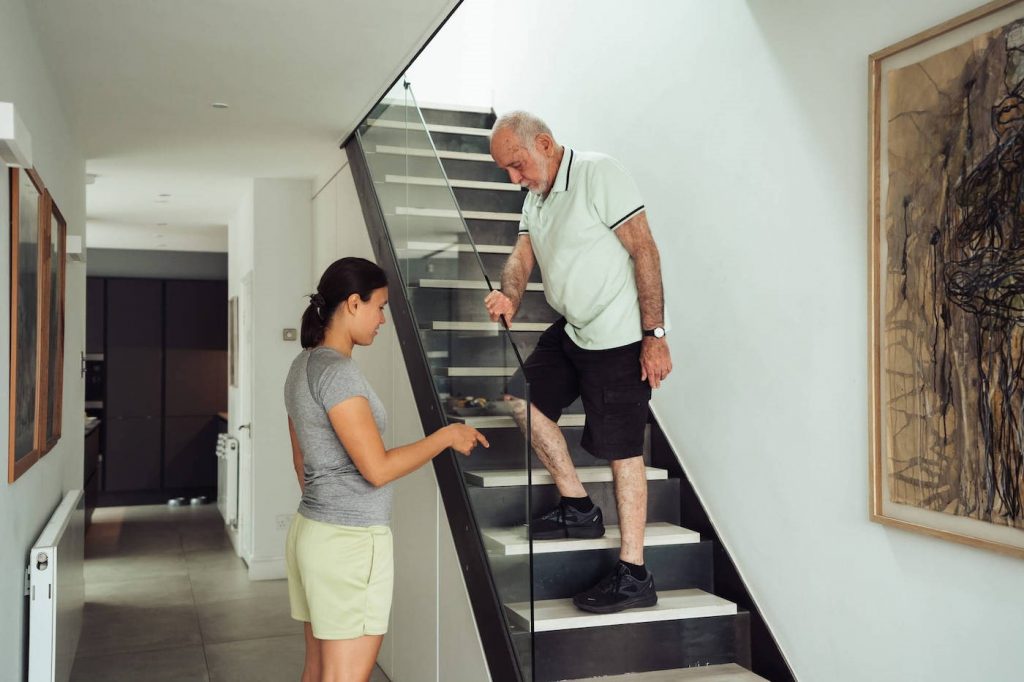This is a short guide to changes to be aware of when working, living or supporting someone living with dementia.
Most of us know someone who has been diagnosed with dementia. If you need to take on their care or learn how best to help or support them, it can feel overwhelming. As physiotherapists we often work with patients with dementia and have put this short article together as a resource for family, friends and carers.
Like all medical conditions, dementia normally starts with quite mild symptoms and then progresses. The needs of the person and their symptoms will change over time, and different types of dementia may progress in different ways.
There are many types of dementia, but the most common are:
- Alzheimer’s disease
- Vascular dementia
- Lewy body
- Young onset dementia
- Frontotemporal dementia.
You can also get dementia related to other health conditions such as, Parkinson’s Disease, alcoholism and Huntington’s Disease. To learn more about the different types, visit: www.dementiauk.com.
There are a number of things to be aware of when someone is living with dementia. These may help you understand and respond more helpfully to their experiences.
Dementia typically does not affect the quality of one’s vision, but how what we see is processed by the brain.
Items that are black or dark colours may be difficult to find, for example a black coat. Such colours may be perceived as a hole in a surface rather than an item. For example, a black mat on the floor might look like a hole and a person with dementia may be reluctant to step on it.
It can be difficult to see the edges of carpeted stairs, making it hard to distinguish individual steps. Steps with clear edges or marked edges can make stairs easier and safer to negotiate independently.
Also, patterned carpets or shiny surfaces can be disorientating and perceived as something else, such as marble floor looking like a swimming pool. It’s therefore important to think about colour, pattern and material when choosing clothing, flooring and wall colours.
Also consider the contrast between different things in the room to make navigating the room easier. Are the colours of the walls and the floor significantly different to make the person more confident in moving about? Are the switches either a different colour to the walls or do they have bright tape around them to make it easier to find them?
Dementia can cause different types of visual hallucinations which can cause panic attacks or anxiety, especially if they see a ‘person’ in their home or something they have a phobia about. To help with this, teach the person to look away or move away from the thing that is causing distress and check if it is still there when they return their gaze. This can help them understand what is and what is not real.
Dementia typically does not affect the quality of one’s vision, but how what we see is processed by the brain.
Items that are black or dark colours may be difficult to find, for example a black coat. Such colours may be perceived as a hole in a surface rather than an item. For example, a black mat on the floor might look like a hole and a person with dementia may be reluctant to step on it.
It can be difficult to see the edges of carpeted stairs, making it hard to distinguish individual steps. Steps with clear edges or marked edges can make stairs easier and safer to negotiate independently.
Also, patterned carpets or shiny surfaces can be disorientating and perceived as something else, such as marble floor looking like a swimming pool. It’s therefore important to think about colour, pattern and material when choosing clothing, flooring and wall colours.
Also consider the contrast between different things in the room to make navigating the room easier. Are the colours of the walls and the floor significantly different to make the person more confident in moving about? Are the switches either a different colour to the walls or do they have bright tape around them to make it easier to find them?
Dementia can cause different types of visual hallucinations which can cause panic attacks or anxiety, especially if they see a ‘person’ in their home or something they have a phobia about. To help with this, teach the person to look away or move away from the thing that is causing distress and check if it is still there when they return their gaze. This can help them understand what is and what is not real.
Eating is a sensory experience and dementia can affect the sensations and change a person’s relationships with food. It often removes the enjoyment, which can result in reduced appetite. Certain medications prescribed for dementia can cause changes in appetites and some can also cause dry mouth.
Changes in their visual perceptions may impact on their ability to eat pale foods off a white plate, for example. They may have difficulty using cutlery as different movements with their hands become tricky; their inability to gauge food temperature can result in burning the mouth; or there may be certain foods they can’t chew fully anymore. Eating becomes a process to just fuel the body.
People living with dementia are often happy eating the same thing every day, as they won’t remember what they ate the previous day, and because it may feel less stressful than having to choose what they will eat.
However, the physical sensations they are feeling on particular days – such as the weather and what the body is craving nutritionally – can make them change their minds about what they are eating.
If you’re cooking for someone living with dementia and they don’t want to eat the food you have prepared, try talk to them about why: do they not like that type of food, is there too much on the plate, are they not hungry at the time you have decided to provide food, is it too difficult to eat, or are they struggling to eat certain food groups?
It might be worth getting an assessment with a speech and language therapist or nutritionist to help you understand foods that are easier to swallow too.
Smell is the only sensory system that bypasses the thalamus, which relays most sensory messages to other parts of the brain. Instead, smell signals go directly go to the hippocampus (which is an important part of the brain for memory) and the amygdala, which has a strong connection with emotions.
Therefore, smells can be used to help retrieve memories more effectively than conversation alone. Exposing people living with dementia to smells they are used to or fond of can help with their emotional stability and reduce depression. By helping them access their memories using smells, you can talk about experiences from the past and connect with the person they were pre-dementia. Like visual hallucinations, people living with dementia can also experience olfactory hallucinations. An example is smelling something burning, which can be distressing as they can’t find the source.
Typically, olfactory hallucinations are linked to past memories and may be triggered by certain events. They only last for a short period, and it’s worth noting when they occur and trying to identify the triggers.
Physical contact can be very powerful in providing people diagnosed with dementia with a feeling of safety and reassurance. Also, when they are struggling with words it can help them show their appreciation.
A study found that a 10-minute foot massage once a day changed the behaviour of people living with dementia in long-term care. They were less aggressive and agitated even two weeks after the massages stopped. The benefits were not just the physical contact, but also the eye contact between the two people, the conversation, and building up a bond which enabled them to relax in that person’s presence.
Physical contact can also help someone living with dementia when they feel confused, disoriented, anxious or lost in a new place or with new people. Having someone to lean on or to lead them can reassure them that someone is there to support them until the anxious period has ended.

Physical movement & independence
It’s important that someone living with dementia is allowed to perform tasks for themselves for as long as possible. This will help maintain their physical ability, but also keep their sense of purpose. Remind them that if they are struggling with something they can ask for your help.
If you can see they’re frequently tripping or are falling more, it may be worth getting an assessment with a physiotherapist or occupational therapist. The therapist can advise on approaches and equipment that will allow them to continue to perform the task independently. This is preferable to giving them heavy support or performing the tasks for them.
Relationships
It is important for people living with dementia to have connections with other people or their communities. A study reported that people living alone sought relationships, and that meetings of any duration, either planned or spontaneous, provided meaningful contact and made people feel safer and less lonely in their neighbourhood. Contact also helped maintain their ability to communicate with others. If they saw these people on a regular basis, they felt there was someone keeping an eye on them, someone who would raise alarms if they were suddenly absent.
People living with dementia also found that the social circle reduced after being diagnosed with dementia. This was due to lack of social awareness of what dementia means; a lack of acceptance of the condition; and a lack of compassion for those living with the disease. This resulted in people losing long-term friends, and also struggling to make new friendships.
Living alone
There are pros and cons to people living with dementia staying alone while they are physically capable of doing so. Having someone in their home can help them remember important dates or appointments, ensure they turn off the cooker, help with tricky tasks like opening tight lids, or just provide general companionship and a sense of safety.
But living alone also gives a person the flexibility to do things at their own pace. If they are constantly being rushed or questioned, it can result in a feeling of failure. Living alone also ensures they maintain their independence and sense of empowerment for as long as possible. However, it can make them intolerant of other people coming into their space.
If you are considering getting a live-in help for someone living with dementia when they are no longer safe living alone, remember that this may cause anxiety and disorientation. It is also important that the helper understands the person, understands their type of dementia, and treats them with dignity, taking their lead on how they wish to be cared for.
Avoid carer burnout
If you’re caring for someone living with dementia, it’s important to have your own self-care strategies to maintain your energy levels, and to understand how and how much you can care for your loved one. It’s okay to get help from other family members or professional carers.
There are also dementia groups that the person living with dementia can attend to provide you with time to rest, do personal chores, and meet up with family or friends.
Further online resources:
Books that can help to understand more:
- What I Wish People Knew about Dementia from Someone Who Knows by Wendy Mitchell
- Talking Sense: Living with Sensory Changes and Dementia by Agnes Houston
In conclusion
Understanding how dementia progresses and what the person living with dementia is experiencing can help you connect, support and be more patient with them. But even if you do understand, caring for someone living with dementia can be hard and frustrating. You may also be grieving for the person they once were which can add to your stress and exhaustion.
Please, take advantage of the support that’s out there.





 This page contains the current position that Mobility Physiotherapy Limited is taking based on the latest government and our professional body guidance to ensure the health and safety of our patients.
This page contains the current position that Mobility Physiotherapy Limited is taking based on the latest government and our professional body guidance to ensure the health and safety of our patients.




